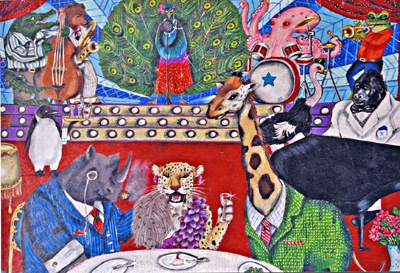All Nonfiction
- Bullying
- Books
- Academic
- Author Interviews
- Celebrity interviews
- College Articles
- College Essays
- Educator of the Year
- Heroes
- Interviews
- Memoir
- Personal Experience
- Sports
- Travel & Culture
All Opinions
- Bullying
- Current Events / Politics
- Discrimination
- Drugs / Alcohol / Smoking
- Entertainment / Celebrities
- Environment
- Love / Relationships
- Movies / Music / TV
- Pop Culture / Trends
- School / College
- Social Issues / Civics
- Spirituality / Religion
- Sports / Hobbies
All Hot Topics
- Bullying
- Community Service
- Environment
- Health
- Letters to the Editor
- Pride & Prejudice
- What Matters
- Back
Summer Guide
- Program Links
- Program Reviews
- Back
College Guide
- College Links
- College Reviews
- College Essays
- College Articles
- Back
The “Benefits” of Trophy Hunting
Imagine this: You are an endangered species that is on the verge of extinction. You do your part in helping the survival of your kind, but all of that is cut short. A millionaire trophy hunter has paid big money to shoot and stuff you. Your family is grief stricken when they find out about what happened to you, but hold onto a feeling of pride. They were told that the money paid to shoot you will go to conservation purposes. They feel as if you are a hero.
Well, it turns out that that did not happen. Your species never received the money that was promised to them, and they are headed towards extinction. The money ended up going to a local government. Same thing happens to other species. While rich people line their pockets with even more money, the animals native to their country are dying. Also, trophy hunting money should go to local communities, but it is not. And, hunters are not following the rules of what is and what is not allowed.
Trophy hunters defend the sport by saying that the money they pat ends up going to local communities. Actually, local villagers barely get any money, if any. Roughly two hundred million dollars is made from trophy hunting per year. Of that, local villages only get about three percent of that. Most of the fees go to local governments and large companies. Why is money that poor people need given to people that have more than enough money? The hunters are just donating to the rich. And that is not the only thing: Hunters are taking advantage of the sport and breaking the rules.
When trophy hunting, there is supposed to be a limit as to how many of one species can be killed a year. Sometimes, though, the limit is broken. Nothing is done about it though because there are corrupt government officials that do not do anything about it. Hunters are also luring lions off of protected areas. This happened not to long ago. During the summer of 2015, well known Cecil the Lion was lured off of the protected grounds of Hwange National Park. Then, Walter Palmer injured Cecil with a bow and arrow. He was then allegedly killed forty hours later with a rifle. Cecil was just one of many lions killed that year, but he was killed illegally. Not only was he lured off of protected grounds, but he was also being studied by researchers at Oxford University.
The last and most important reason why trophy hunting should not be allowed is that the animals are not benefiting. Hunters say that they hunt the animals because they are giving the money to conservation efforts. But, the chance of survival of endangered species is getting worse and worse. This is happening in Tanzania. Trophy hunting is allowed in Tanzania, and elephant populations have decreased by sixty percent in the past five years. You would think that this would signify that trophy hunting should not be allowed for elephants. Maybe the hunters could shoot something else, that is not heading towards extinction. That way elephants can reproduce to build up their population.
I am not saying that we should totally ban trophy hunting. It is a popular sport that has been around forever. I think that trophy hunting should not be allowed for species threatened by extinction, like the African Elephant, or the African Lion. Instead, they could hunt a cougar, a species that is not threatened by extinction. Then when the endangered animals have gained numbers, then a strong quota must be set so they are not threatened by extinction. That way, the hunter gets his trophy, and the animals don’t face extinction.

Similar Articles
JOIN THE DISCUSSION
This article has 1 comment.

My piece is about why we should be protecting endangered species from trophy hunting.